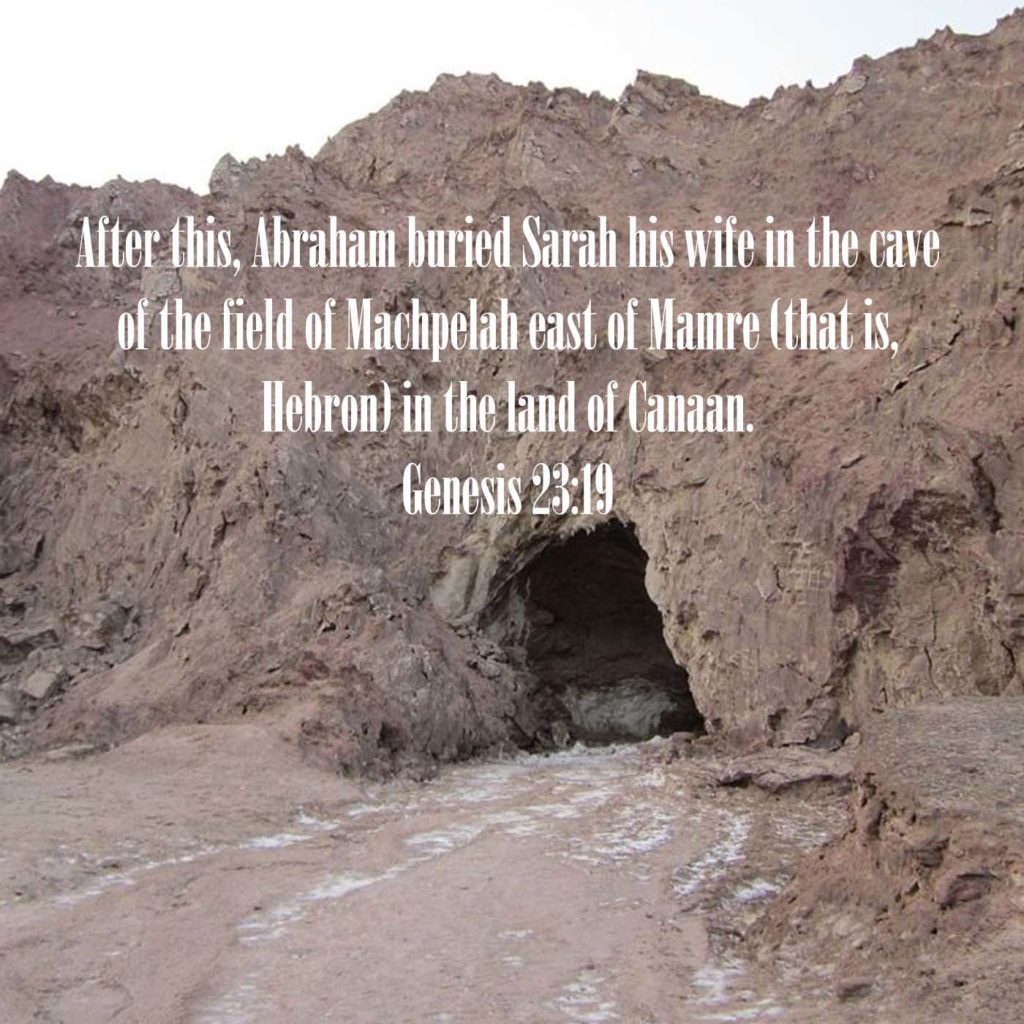
1 Sarah lived 127 years; these were the years of the life of Sarah.
This is the first time the text specifically mentions the death and age of a woman. All of the genealogies had focused on the men, but now, as a member of God’s covenant, Sarah’s death is also recorded. She is the only woman in the bible to have all of this recorded. At this time Abraham would be about 147, and Isaac would be in his mid to late 30s, although I should mention here that as people in this part of Genesis are living longer than what would be considered normal today, Isaac is still considered a young man, perhaps equivalent to a man in his 20s.
2 And Sarah died at Kiriath-arba (that is, Hebron) in the land of Canaan, and Abraham went in to mourn for Sarah and to weep for her.
Kiriath-arba, or Hebron, was in southern Canaan, but further north from Gerar and Abimelech.
Sarah’s death brought on a period of mourning, and Abraham went into her tent (they had separate tents) to mourn her death.
3 And Abraham rose up from before his dead and said to the Hittites, 4 “I am a sojourner and foreigner among you; give me property among you for a burying place, that I may bury my dead out of my sight.”
Abraham then goes to his Canaanite neighbors to ask to buy some land. The text calls them Hittites, but they were likely not of the Hittite empire, archaeology does not support the Hittites ever being in the region near Hebron.
Abraham buying land is a significant step. If he were to buy a specific place to bury Sarah, the same piece of land would be legally passed down to all of their descendants. This is the first time Abraham is taking a step in inheriting the land God promised to him.
5 The Hittites answered Abraham, 6 “Hear us, my lord; you are a prince of God among us. Bury your dead in the choicest of our tombs. None of us will withhold from you his tomb to hinder you from burying your dead.”
The response of the “Hittites” is one out of respect to Abraham. They are willing to let him bury Sarah in any of their tombs for free.
I find it interesting that they treat Abraham whom they call “the prince of God” with such respect. It seems that in his time among them Abraham has been acting almost as a missionary, and because of Abraham, these Canaanite neighbors of his have come to worship God as well.
7 Abraham rose and bowed to the Hittites, the people of the land. 8 And he said to them, “If you are willing that I should bury my dead out of my sight, hear me and entreat for me Ephron the son of Zohar, 9 that he may give me the cave of Machpelah, which he owns; it is at the end of his field. For the full price let him give it to me in your presence as property for a burying place.”
Abraham is likely speaking with the city council or elders about purchasing a piece of land, He is grateful for their offer to let him use a tomb, and shows his respect by bowing to them. However he is not looking for a borrowed tomb, he is looking to by a piece of land, and specifically asks for the cave of Machpelah, where the first few generations of Abraham’s family would be buried. He offers to pay Ephron, the owner full price, whatever he asks for.
10 Now Ephron was sitting among the Hittites, and Ephron the Hittite answered Abraham in the hearing of the Hittites, of all who went in at the gate of his city, 11 “No, my lord, hear me: I give you the field, and I give you the cave that is in it. In the sight of the sons of my people I give it to you. Bury your dead.”
Again there is evidence that they are meeting with a city council, at the city gates, as was common in the ancient near east. Ephron offers to straight up give the land to Abraham, again suggesting the great respect the people had for “the prince of God.” This is a very public proclamation. Most of the people of the city would likely have known of it.
12 Then Abraham bowed down before the people of the land. 13 And he said to Ephron in the hearing of the people of the land, “But if you will, hear me: I give the price of the field. Accept it from me, that I may bury my dead there.”
Abraham again bows to show his gratitude for the offer before refusing, he wants to pay full price for the land.
14 Ephron answered Abraham, 15 “My lord, listen to me: a piece of land worth four hundred shekels of silver, what is that between you and me? Bury your dead.” 16 Abraham listened to Ephron, and Abraham weighed out for Ephron the silver that he had named in the hearing of the Hittites, four hundred shekels of silver, according to the weights current among the merchants.
Ephron names the price, almost begrudgingly. His wording suggests it is a trivial manner, he really does not care if Abraham pays him or not. Abraham wastes no time and pays Ephron.
The price 400 shekels of silver, was actually the standard rate for any piece of real estate at the time, there are various ancient texts that record that price as the price of land.
Note that shekels are a weight unit, not a type of coin. This made it easier for merchants who dealt with several kingdoms to keep things fair, they did not have to worry about exchange rates, only the weight of the gold and silver they carried. They definition of a shekel depended on the weight the specific merchant was using, and often changed before kings decreed an official weight of a shekel.
17 So the field of Ephron in Machpelah, which was to the east of Mamre, the field with the cave that was in it and all the trees that were in the field, throughout its whole area, was made over 18 to Abraham as a possession in the presence of the Hittites, before all who went in at the gate of his city.
Here we have an interesting note that the cave is near Mamre, one of the places where Abraham often lived.
The entire proceeding was held in public. This could have been for several reasons, the most practical being that news of the transaction would spread quickly, so that no one would assume Abraham was trying to steal land. It also mean that the entire community had a say in whether someone’s land could be bought or sold. People in that time were much more group oriented, they made descisions together for the benefit of the group not the individual.
19 After this, Abraham buried Sarah his wife in the cave of the field of Machpelah east of Mamre (that is, Hebron) in the land of Canaan. 20 The field and the cave that is in it were made over to Abraham as property for a burying place by the Hittites.
Abraham buried Sarah in the cave. She would be the first to be buried here, however several generations of their family would use this specific cave.
The burial practices of the ancient near east usually included a cave, where the dead would remain until decomposition had finished before burying the bones in a field. The cave would have been big enough to hold perhaps two or three bodies at one time before they were interred into the ground.
